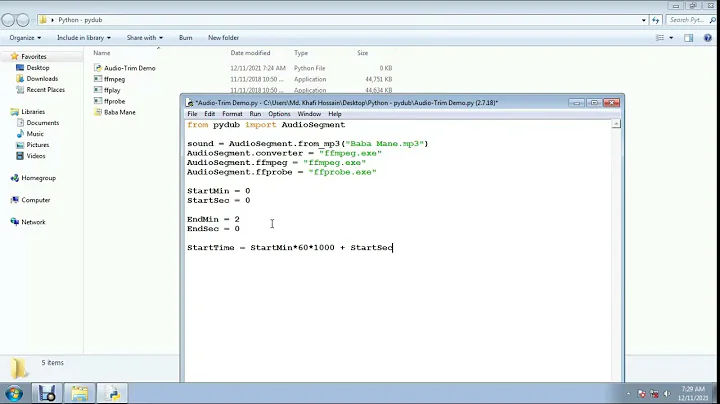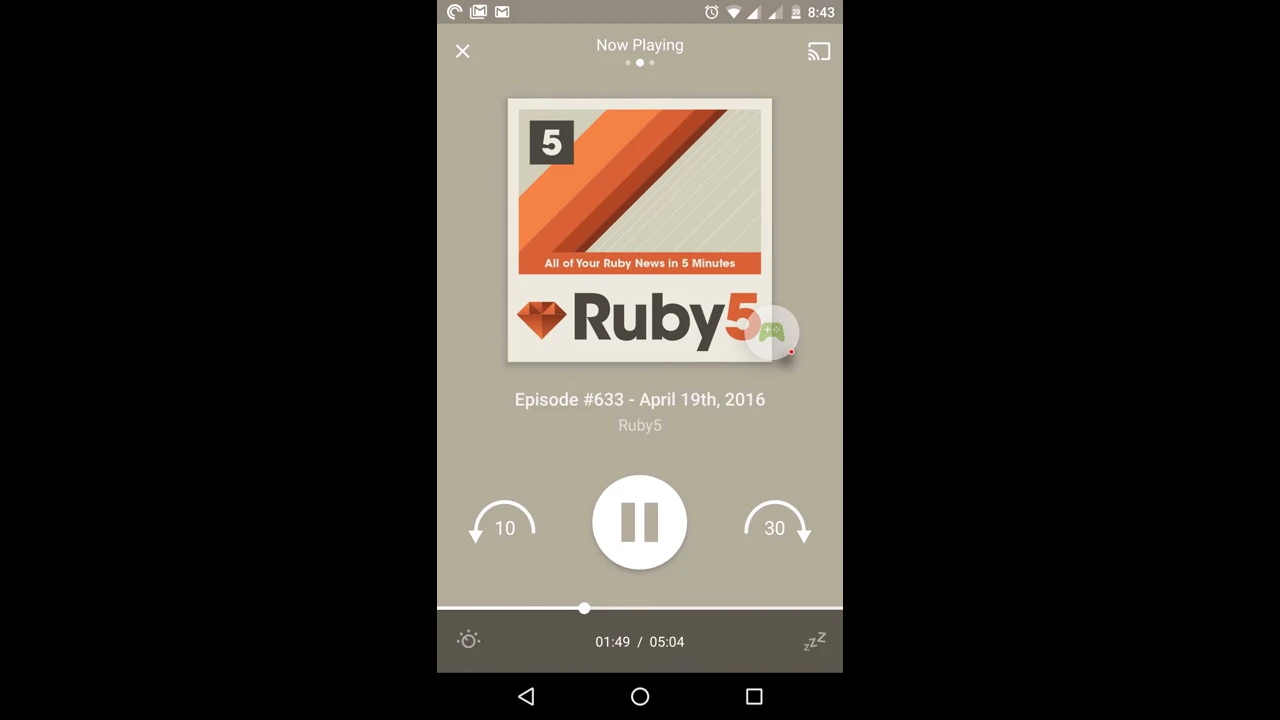How to change audio playback speed using Pydub?
Solution 1
sound.set_frame_rate() does a conversion, it should not cause any "chipmunk effect", but what you can do is change the frame rate (without a conversion) and then convert the audio from there back to a normal frame rate (like 44.1 kHz, "CD quality")
from pydub import AudioSegment
sound = AudioSegment.from_file(…)
def speed_change(sound, speed=1.0):
# Manually override the frame_rate. This tells the computer how many
# samples to play per second
sound_with_altered_frame_rate = sound._spawn(sound.raw_data, overrides={
"frame_rate": int(sound.frame_rate * speed)
})
# convert the sound with altered frame rate to a standard frame rate
# so that regular playback programs will work right. They often only
# know how to play audio at standard frame rate (like 44.1k)
return sound_with_altered_frame_rate.set_frame_rate(sound.frame_rate)
slow_sound = speed_change(sound, 0.75)
fast_sound = speed_change(sound, 2.0)
Solution 2
from pydub import AudioSegment
from pydub import effects
root = r'audio.wav'
velocidad_X = 1.5 # No puede estar por debajo de 1.0
sound = AudioSegment.from_file(root)
so = sound.speedup(velocidad_X, 150, 25)
so.export(root[:-4] + '_Out.mp3', format = 'mp3')
Solution 3
This can be done using pyrubberband package which requires rubberband library that can stretch audio while keeping the pitch and high quality. I was able to install the library on MacOS using brew, and same on Ubuntu with apt install. For extreme stretching, look into PaulStretch
brew install rubberband
This works simply with librosa package
import librosa
import pyrubberband
import soundfile as sf
y, sr = librosa.load(filepath, sr=None)
y_stretched = pyrubberband.time_stretch(y, sr, 1.5)
sf.write(analyzed_filepath, y_stretched, sr, format='wav')
To make pyrubberband work directly with AudioSegment from pydub without librosa I fiddled this function:
def change_audioseg_tempo(audiosegment, tempo, new_tempo):
y = np.array(audiosegment.get_array_of_samples())
if audiosegment.channels == 2:
y = y.reshape((-1, 2))
sample_rate = audiosegment.frame_rate
tempo_ratio = new_tempo / tempo
print(tempo_ratio)
y_fast = pyrb.time_stretch(y, sample_rate, tempo_ratio)
channels = 2 if (y_fast.ndim == 2 and y_fast.shape[1] == 2) else 1
y = np.int16(y_fast * 2 ** 15)
new_seg = pydub.AudioSegment(y.tobytes(), frame_rate=sample_rate, sample_width=2, channels=channels)
return new_seg
Solution 4
I know it's late but I wrote a program to convert mp3 to different playback speed.
First, Convert the .MP3 -> .Wav because PYRubberBand supports only .wav format. Then streach the time and pitch at the same time to avoid chipmunk effect.
import wave
import sys
from pydub import AudioSegment
#sound = AudioSegment.from_file("deviprasadgharpehai.mp3")
sound = AudioSegment.from_mp3(sys.argv[1])
sound.export("file.wav", format="wav")
print(sys.argv[1])
import soundfile as sf
import pyrubberband as pyrb
y, sr = sf.read("file.wav")
# Play back at extra low speed
y_stretch = pyrb.time_stretch(y, sr, 0.5)
# Play back extra low tones
y_shift = pyrb.pitch_shift(y, sr, 0.5)
sf.write("analyzed_filepathX5.wav", y_stretch, sr, format='wav')
sound = AudioSegment.from_wav("analyzed_filepathX5.wav")
sound.export("analyzed_filepathX5.mp3", format="mp3")
# Play back at low speed
y_stretch = pyrb.time_stretch(y, sr, 0.75)
# Play back at low tones
y_shift = pyrb.pitch_shift(y, sr, 0.75)
sf.write("analyzed_filepathX75.wav", y_stretch, sr, format='wav')
sound = AudioSegment.from_wav("analyzed_filepathX75.wav")
sound.export("analyzed_filepathX75.mp3", format="mp3")
# Play back at 1.5X speed
y_stretch = pyrb.time_stretch(y, sr, 1.5)
# Play back two 1.5x tones
y_shift = pyrb.pitch_shift(y, sr, 1.5)
sf.write("analyzed_filepathX105.wav", y_stretch, sr, format='wav')
sound = AudioSegment.from_wav("analyzed_filepathX105.wav")
sound.export("analyzed_filepathX105.mp3", format="mp3")
# Play back at same speed
y_stretch = pyrb.time_stretch(y, sr, 1)
# Play back two smae-tones
y_shift = pyrb.pitch_shift(y, sr, 1)
sf.write("analyzed_filepathXnormal.wav", y_stretch, sr, format='wav')
sound = AudioSegment.from_wav("analyzed_filepathXnormal.wav")
sound.export("analyzed_filepathXnormal.mp3", format="mp3")
**Make Sure to install **
Wave, AudioSegment, FFmpeg, PYRubberBand, Soundfile
To use this Run,
python3 filename.py mp3filename.mp3
Related videos on Youtube
Comments
-
 itsMe almost 2 years
itsMe almost 2 yearsI am new learner of audio editing libs - Pydub. I want to change some audio files' playback speed using Pydub(say .wav/mp3 format files), but I don't know how to make it. The only module I saw that could possibly deal with this problem is speedup module in effect.py. However, there is no explanation about how I am supposed to call it.
Could anyone kindly explain how to do this task in Pydub? Many thanks!
(A related question: Pydub - How to change frame rate without changing playback speed, but what I want to do is to change the playback speed without changing the audio quality.)
-
 itsMe almost 6 yearsHi abhi! Thank you so much for your answer!! I tried it and it works (THANKS A LOT!!), but there is still a problem that the audio pitch changes as well along with the speed, while altering
itsMe almost 6 yearsHi abhi! Thank you so much for your answer!! I tried it and it works (THANKS A LOT!!), but there is still a problem that the audio pitch changes as well along with the speed, while alteringframe_rate. I was wondering whether there is a way of only changing the audio speech and keeping pitch the same (or a way of switching the pitch back to the original)? Thanks in advance! -
 abhi krishnan almost 6 yearsThankYou brother happy to hear it.
abhi krishnan almost 6 yearsThankYou brother happy to hear it. -
 itsMe almost 6 yearsIt does change the speed, but I was wondering whether there is a way of only changing the audio speech and keeping pitch the same? I've worked on it for a while, but didn't find a module to fix it. Do you have any idea about how to achieve it? Thanks!
itsMe almost 6 yearsIt does change the speed, but I was wondering whether there is a way of only changing the audio speech and keeping pitch the same? I've worked on it for a while, but didn't find a module to fix it. Do you have any idea about how to achieve it? Thanks! -
 Jun711 over 2 yearsHi, why is y_stretch not passed to pitch_shift function? when you write the result, you seem to use only y_stretch. Could you please explain how it works?
Jun711 over 2 yearsHi, why is y_stretch not passed to pitch_shift function? when you write the result, you seem to use only y_stretch. Could you please explain how it works? -
Jesse Vincent over 2 yearsThis worked a lot better than other solutions I've found! Thank you.






![[HOW TO] Adjust PLAYBACK SPEED for AUDIO Files in PowerPoint](https://i.ytimg.com/vi/FSoLnGdW3Qg/hq720.jpg?sqp=-oaymwEcCNAFEJQDSFXyq4qpAw4IARUAAIhCGAFwAcABBg==&rs=AOn4CLAH1gsFAsa4qCCkdcshDK2EpBgbDw)


